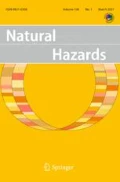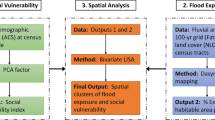Abstract
This article evaluates some of the factors which limit the human benefits of hazard warnings, with specific reference to flood warnings, and we conclude by suggesting ways of enhancing these benefits. We focus mainly upon the economic benefits generated by flood damage savings by households that warnings facilitate; health effects of flooding and flood warnings; and the effects of warnings on loss of life and physical injury. Our results, based partly upon surveys of flooded households, reveal that economic benefits are currently more limited than we previously thought, but that for several reasons these benefits are likely to be under-estimated. We argue that the intangible benefits to public health, safety and security must also be taken into account in decisions about investment in flood warnings. In England and Wales, the public’s response to flood warnings is currently low and is a key benefit-limiting factor which could begin to undermine a recent major shift in national flood risk management policy towards a more people-centred, portfolio approach in which changing human behaviour is viewed as important. Using a trans-disciplinary approach, we discuss the evidence and literature surrounding this poor response, and suggest a number of ways in which the issue may be addressed in future.




Similar content being viewed by others
References
Andryszewski A, Evans K, Haggett C, Mitchell B, Whitfield D (2005) Flood warning—The next step-change. Environment Agency, Bristol
Bye P, Horner M (1998) Easter 1998 floods: final assessment by the independent review team. Environment Agency, Bristol
Chatterton JB, Pirt J, Wood TR (1979) The benefits of flood forecasting. J Inst Water Eng Sci 33(3):237–52
Defra (2005) Making space for water: Taking forward a new Government strategy for flood and coastal erosion risk management in England. First government response to the autumn 2004 Making Space for Water consultation exercise. Department for the Environment, Food and Rural Affairs, London
Drabek TE (1986) Human system responses to disaster: an inventory of sociological findings. Springer-Verlag, New York
Environment Agency (2003) Flood Warning Investment Strategy Appraisal Report 2003/04 to 20012/13, National Flood Warning Centre, Environment Agency, Frimley
Environment Agency (2005) Managing flood risk: Dealing with floods—A review of the floods in northern England and North Wales January 2005, Environment Agency, Bristol
European Environment Agency (2003) Mapping the impacts of recent natural disasters and technological accidents in Europe. European Environment Agency, Copenhagen
Evans EP, Ashley R, Hall J, Penning-Rowsell EC, Saul A, Sayers P, Thorne C, Watkinson A (2004) Foresight: Future flooding, 2 volumes. Office of Science and Technology, London
Few R, Ahern M, Natthies F, Kovats S (2004) Floods, health and climate change: a strategic review. Working Paper 63. Tyndall Centre for Climate Change Research, University of East Anglia, Norwich
Fischhoff B, Riley D, Kovacs DC, Small M (1998) What Information Belongs in a Warning ? Psychology and Marketing 15(7):663–686
Goldberg D, Williams P (1988) A user’s guide to the general health questionnaire. NFER-NELSON, Windsor
Green CH, Emery PJ, Penning-Rowsell EC, Parker DJ (1985) The health effects of flooding: a survey at Uphill, Avon. FHRC, Middlesex University, Enfield
Gruntfest E, Ripps A (2000) Flash floods: warning and mitigation efforts and prospects. In: Parker DJ (ed) Floods. Vol 1. Routledge, London, pp 377–390
Jonkman SN, Kelman I (2005) An analysis of the causes and circumstances of flood disaster deaths. Disasters 29(1):75–97
Johnson CL, Tunstall SM, Penning-Rowsell EC (2005) Floods as catalysts for policy change: historical lessons from England and Wales. Int J Water Res Dev 21:561–575
Kates RW (1962) Hazard and Choice Perception in Flood Plain Management, Department of Geography, Research Paper 78, University of Chicago, Chicago
Lopez-Vazquez E, Marvan ML (2003) Risk perception, stress and coping strategies in two catastrophe risk situations. Soc Behav Pers 31(1):61–70
McCarthy S, Parker DJ, Penning-Rowsell EC (2006) Preconsultation Social Survey, Community Based Flood Risk Reduction Options: Walton Bridge to Teddington. FHRC, Middlesex University, Enfield
Messner F, Kaltofen M, Koch H, Zwirner O (2005) Integrative wasserwirtschaftliche und ökonomische Bewertung von Flussgebietsbewirtschaftungsstrategien. In: Wechsung F, Becker A, Gräfe P (Hrg.) Auswirkungen des Globalen Wandels auf Wasser, Umwelt und Gesellschaf im Elbegebiet. Weißenseeverlag, Berlin, pp 260–272
Morgan MG, Fischhoff B, Bostrom A, Atman CJ (2002) Risk communication: a mental models approach. Cambridge University Press, Cambridge
Parker DJ (2004) Designing flood forecasting, warning and response systems from a societal perspective. Meteorologische Zeitschrift 13(1):5–11
Parker DJ (1991) The damage-reducing effects of flood warnings. Report prepared for Halcrow and the National Rivers Authority. FHRC, Middlesex University, Enfield
Parker DJ, Thompson PM, Green CH (1987) Urban flood protection benefits: a project appraisal guide. Gower Technical Press, Aldershot
Penning-Rowsell EC, Chatterton JB (1977) The benefits of flood alleviation: a manual of assessment techniques. Gower Technical Press, Aldershot
Penning-Rowsell EC, Chatterton JB, Parker DJ (1978) The effect of flood warning on flood damage reduction, a report for the central water planning unit. FHRC, Middlesex University, Enfield
Penning-Rowsell EC, Parker DJ, Crease D, Mattison C (1983) Flood warning dissemination: an evaluation of some current practices in the Severn Trent Water Authority Area. FHRC. Middlesex University, Enfield
Penning-Rowsell EC, Green CH, Thompson PM, Coker AC, Tunstall SM, Richards C, Parker DJ (1992) The economics of coastal management: a manual of benefit assessment techniques. Belhaven Press, London
Penning-Rowsell EC, Johnson C, Tunstall S, Tapsell S, Morris J, Chatterton J, Green C (2005a) The benefits of flood and coastal risk management: a manual of assessment techniques. Middlesex University Press, London
Penning-Rowsell EC, Floyd P, Ramsbottom D, Surendran S (2005b) Estimating injury and loss of life in floods: a deterministic framework. Nat Hazards 36:43–64
Penning-Rowsell EC, Tapsell S, Wilson T (2004) Some policy implications of the health effects of floods. World Health Organisation Conference, Bratislava, Hungary
Perry RW, Lindell MK, Greene MR (1981) Evacuation planning in emergency management. Lexington Books, Lexington
Reacher M, McKenzie K, Lane C, Nichols T, Iversen A, Hepple P, Walter T, Laxton C, Simpson J (2003) Health impacts of flooding in Lewes: a comparison of reported gastrointestinal and other illness and mental health in flooded and non-flooded Households. Comm Dis Publ Health 7(1):1–8
RPA/FHRC (Risk and Policy Analysts/Flood Hazard Research Centre) (2004) The appraisal of human-related intangible impacts of flooding. Report to Defra/EA, R&D Project FD2005, Defra, London
Scott W, Dua J (1999) Development of a scale to assess post traumatic stress disorder. Int J Stress Manage 6(3):149–165
Slovic P (1993) Perceived risk, trust, and democracy. Risk Anal 13:675–682
Tapsell SM, Tunstall SM, Penning-Rowsell EC, Handmer JW (1999) The Health Effects of the Easter 1998 Flooding in Banbury and Kidlington. Report to the Environment Agency, Thames Region. FHRC, Middlesex University, Enfield
Tapsell SM, Tunstall SM (2000) Follow-up of the Health Effects of the Easter 1998 Flooding in Banbury and Kidlington. Final Report to the Environment Agency, Thames Region. FHRC, Middlesex University, Enfield
Tapsell SM, Tunstall SM (2001) The Health and Social Effects of the June 2000 Flooding in the North East Region. Report to the Environment Agency, Thames Region. FHRC, Middlesex University, Enfield
Tapsell SM, Burton R, Parker DJ, Oakes S (2004) The Social Performance of Flood Warning Communications Technologies. Technical Report to the Environment Agency, FHRC, Middlesex University, Enfield
Thrush D, Burningham K, Fielding J (2005) Flood Warning for Vulnerable Groups: A review of the literature. R&D Technical Report W5C-018/1–4, Environment Agency, Bristol
Trettin L, Musham C (2000) Is trust a realistic goal of environmental risk communication? Environ Behav 31(3):410–26
Tunstall SM, Tapsell S, Fernandez-Bilbao A (2005) The damage-reducing effects of flood warnings: results from new data collection. FHRC, Middlesex University, Enfield
Tunstall S, Tapsell S, Green C, Floyd P, George C (2006) The health effects of flooding: social research results from England and Wales. J Water Health 4:365–380
Tversky A, Kahneman D (1973) Availability: a heuristic for judging frequency and probability. Cogn Psychol 5(2):207–232
Acknowledgements
The authors acknowledge, and thank for permission to publish research results, the following research funders: Defra/Environment Agency (Projects FD 2014, FD 2317 and FD2005), European Commission FLOODsite project (GOCE-CT-2004-505420), Environment Agency (Lower Thames Preconsultation Social Survey); and Sylvia Tunstall, Edmund Penning-Rowsell, Amalia Fernandez-Bilboa and Theresa Wilson for contributions to the development of this article.
Author information
Authors and Affiliations
Corresponding author
Rights and permissions
About this article
Cite this article
Parker, D., Tapsell, S. & McCarthy, S. Enhancing the human benefits of flood warnings. Nat Hazards 43, 397–414 (2007). https://doi.org/10.1007/s11069-007-9137-y
Received:
Accepted:
Published:
Issue Date:
DOI: https://doi.org/10.1007/s11069-007-9137-y




